The German Shorthaired Pointer is a versatile and active dog renowned for its friendly temperament, high energy, and excellent hunting abilities. Originating in Germany, this breed was developed in the 19th century to be the ideal all-purpose hunting companion. Today, German Shorthaired Pointers continue excelling in the field while making wonderful family pets.
This comprehensive guide will explore the history, physical traits, exercise needs, and personality of the German Shorthaired Pointer to help you decide if this breed would fit your lifestyle.
Table of Contents
- 1 History and Origins
- 2 Physical Characteristics
- 3 High Energy Levels Require Plenty of Exercise
- 4 Trainability and Temperament
- 5 Compatibility with Children and Other Pets
- 6 Grooming and Care
- 7 Training Tips for German Shorthaired Pointers
- 8 Finding a Healthy German Shorthaired Pointer Puppy
- 9 Related posts:
- 10 German Shorthaired Pointer Colors: A Complete Guide
- 11 German Shorthaired Pointer Puppy Guide: Breed Info & Care
- 12 Managing German Shorthaired Pointer Shedding: Expert Tips
- 13 German Shorthaired Pointer: Breed Info & Facts
History and Origins
The German Shorthaired Pointer traces its origins back to the early 1800s in Germany, where breeders aimed to develop the ultimate hunting dog. By crossbreeding German bird dog breeds like the German Pointer, Spanish Pointer, and various scent hounds, breeders were able to create a dog with exceptional versatility, intelligence, and ability to work on both land and in the water.
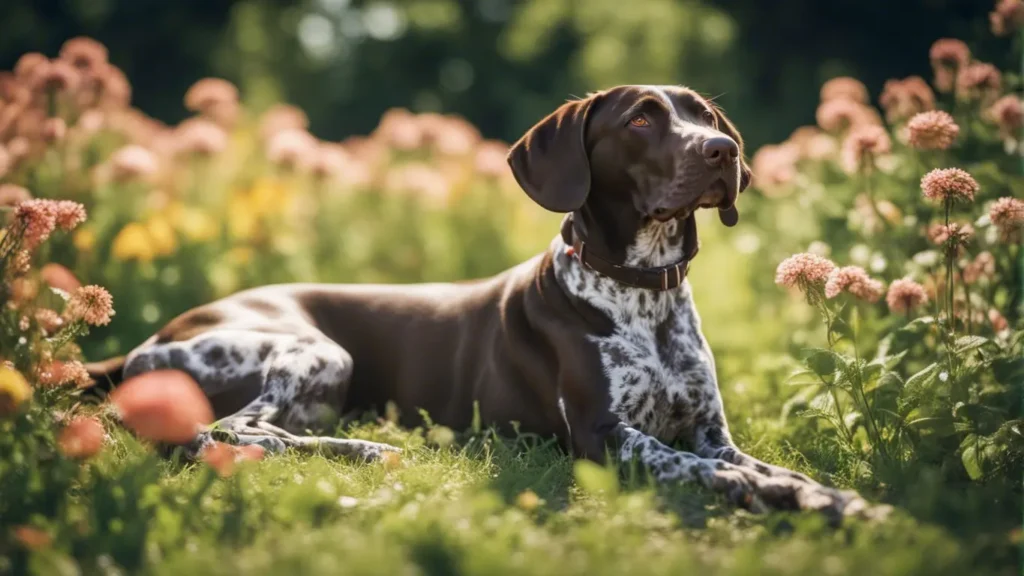
The definitive characteristics of the German Shorthaired Pointer were established through careful selective breeding throughout the 1800s and early 1900s. By combining the qualities of scent hounds, gundogs, and working dogs, breeders developed a breed renowned for its endurance, speed, retrieving skills, and ability to locate and point game.
The German Shorthaired Pointer was officially recognized by the American Kennel Club in 1930 and has steadily grown in popularity, ranking 16th most popular breed in 2022. Today, their reputation as an energetic, intelligent, and friendly breed makes them ideal for active individuals and families.
Physical Characteristics
The German Shorthaired Pointer has a sleek, athletic build that enables speed, agility, and endurance. They have a short, dense coat that is water-resistant and requires minimal grooming. Coat colors can range from liver and white liver roan to solid liver.
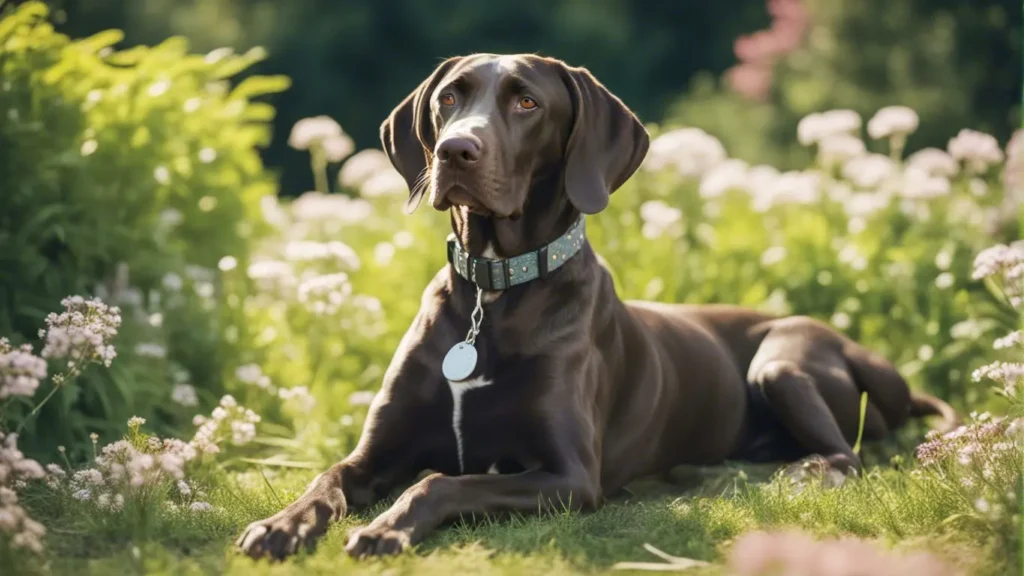
These medium to large dogs typically stand between 21-25 inches tall at the shoulder and weigh 45-70 pounds. They have long, slender tails, floppy ears, and webbed feet, which aid their versatility in water. Their athletic physique shows the definition of chest, shoulders, and hip muscles.
The overall appearance of the German Shorthaired Pointer is both elegant and functional. Everything from the short coat to the webbed feet and muscular build allows this breed to perform efficiently in the field while retaining a refined look.
High Energy Levels Require Plenty of Exercise
A defining characteristic of the German Shorthaired Pointer is their exceptionally high energy level and stamina. This breed is always raring to go and requires vigorous daily exercise. Without adequate physical activity, these dogs are prone to destructive behaviors like chewing and digging, stemming from boredom and pent-up energy.
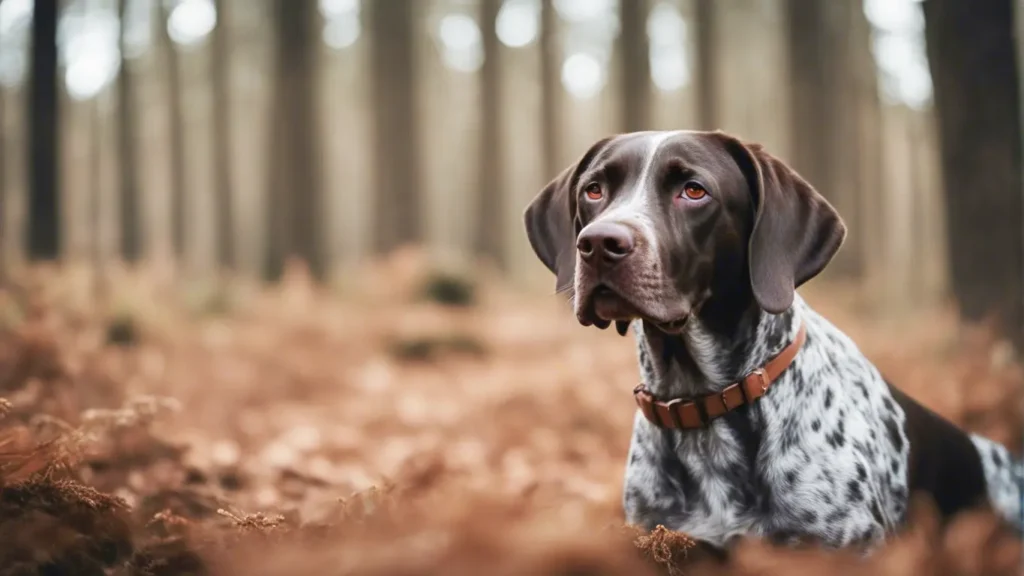
German Shorthaired Pointers need at least 60-90 minutes of intense exercise daily. Activities like running, hiking, swimming, retrieving games, and off-leash walks allow them to burn through their boundless energy. Mental stimulation through obedience training, scent games, and interactive toys is also essential.
This breed thrives when they have a job to do. Whether joining you on a hike, playing a rousing game of fetch, or participating in dog sports like agility, field trials, or dock diving, the German Shorthaired Pointer is always eager to put their athleticism and intelligence to good use.
Trainability and Temperament
The German Shorthaired Pointer has a people-oriented temperament and excels at both hunting and companionship roles. They form close bonds with family and have an innate desire to please their owners. This makes them highly responsive to positive reinforcement training methods.
German Shorthaired Pointers are intelligent, eager to learn, and highly trainable. Their versatility and adaptability stem from their breeding to serve as all-purpose hunting dogs. This allows them to transition smoothly from energetic field companions to relaxed household pets.
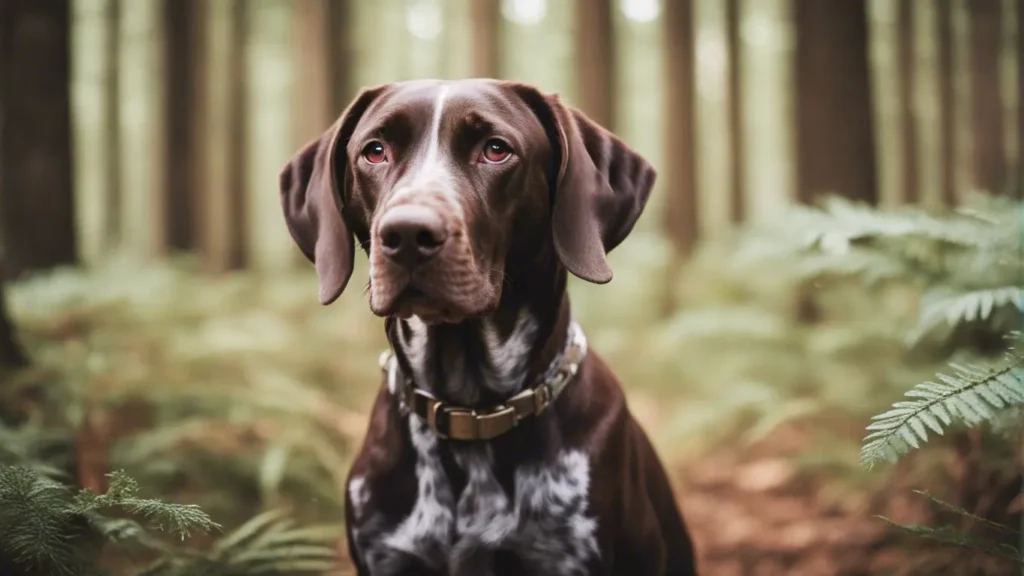
This breed aims to work cooperatively with humans and is loyal and affectionate. Their outgoing nature means they actively seek attention and playtime with their family. However, their strong prey drive means early socialization is essential for getting along with other household pets.
As natural hunters, German Shorthaired Pointers exhibit point-and-retrieve instincts from a young age. Patience and positive reinforcement are needed to channel these impulses constructively. Proper training and stimulation are vital in preventing problematic behaviors.
Compatibility with Children and Other Pets
When raised alongside children and properly socialized, the German Shorthaired Pointer does remarkably well in homes with kids. Their playful and patient temperament makes them an ideal companion for active children who can match their energy levels.
As with any breed, supervision is essential when German Shorthaired Pointers interact with young children, given their boisterous nature. Teaching children how to interact gently with a dog is also crucial. With early socialization and training, this breed is excellent with kids.
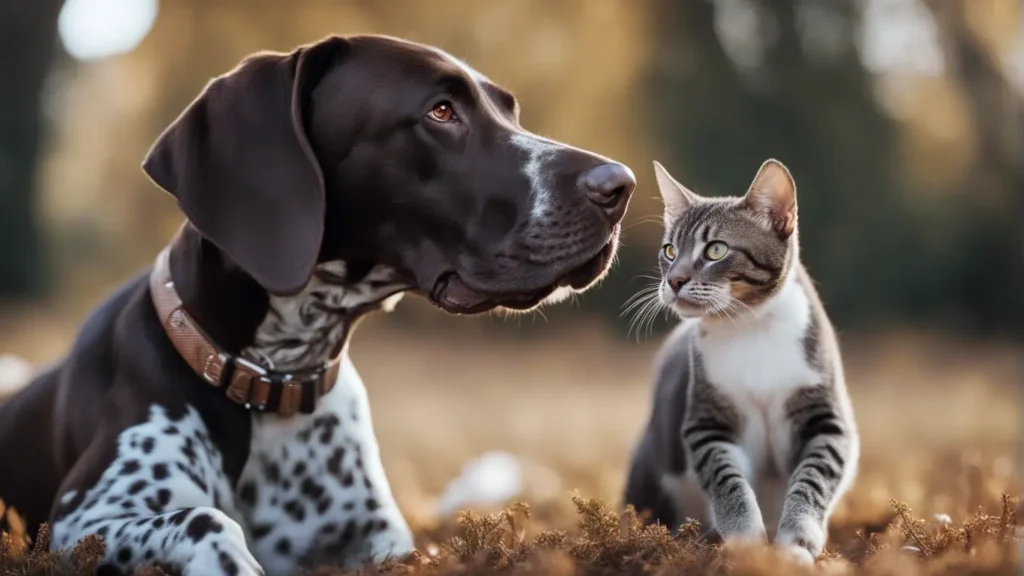
In households with other pets, such as cats or small mammals, careful introduction is required due to the high prey drive in this hunting dog. However, when raised alongside other pets from puppyhood, the German Shorthaired Pointer can successfully coexist with them. Proper training is vital for minimizing their instinct to chase small fleeing creatures.
This breed does well sharing a home with other canines. Their fondness for brisk outdoor activity and playtime means German Shorthaired Pointers often thrive when paired with another energetic dog that can help fulfill their exercise needs.
Overall, the German Shorthaired Pointer’s friendly temperament and affectionate nature allow them to adapt to various living situations as long as they receive adequate physical and mental stimulation.
Grooming and Care
A major appeal of the German Shorthaired Pointer breed is the ease of care for their short, dense coat. Occasional brushing to control shedding combined with monthly baths are typically all that is needed grooming-wise.
Their coat sheds moderately year-round. More frequent brushing during seasonal shedding periods can help keep loose hair under control. Their nails should be trimmed regularly to avoid cracking or splitting. Their floppy ears will also need periodic cleaning to prevent infection.
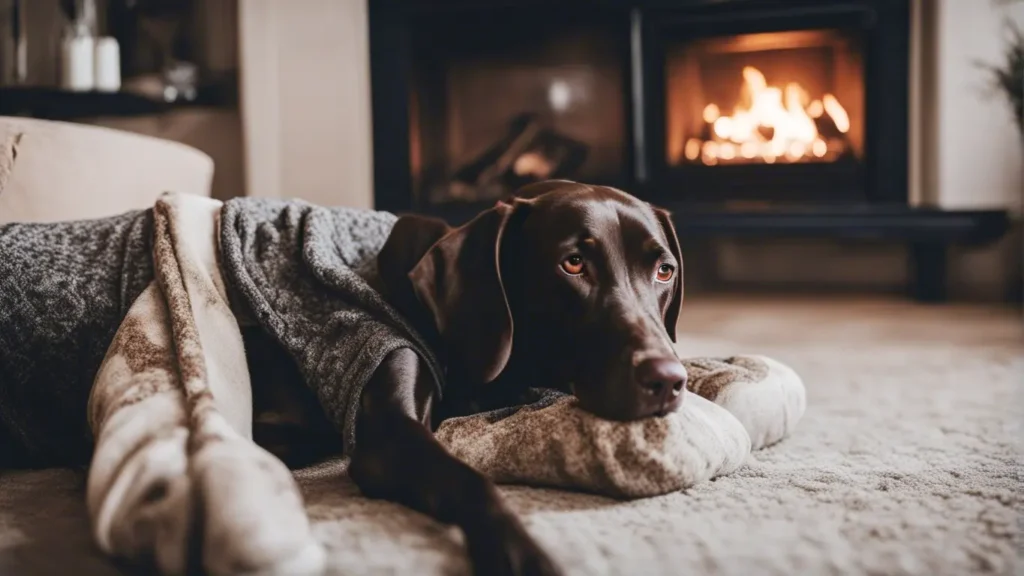
German Shorthaired Pointers require a high-quality diet designed for active sporting dogs. This provides the nutrition and calories needed to fuel their energetic lifestyle and maintain ideal body condition. Monitoring treats is essential to prevent obesity.
This breed has minimal health problems, but hip dysplasia and eye issues like cataracts can sometimes occur later in life. Reputable breeders will screen breeding dogs for these conditions to reduce risk. Routine vet checkups help detect any concerns early.
The ideal home for a German Shorthaired Pointer can provide consistent exercise, training, playtime, and companionship. Their active nature means they thrive when included in family activities and outdoor adventures. Providing both mental and physical stimulation is critical to their happiness.
Training Tips for German Shorthaired Pointers
The intelligence and eagerness to please the German Shorthaired Pointer make training these dogs highly rewarding when done correctly. Here are some top training tips:
- Start training early using positive reinforcement like food rewards and praise. This builds a cooperative foundation.
- Channel their energy into structured activities like obedience, agility or retrieving games. This provides mental and physical stimulation.
- Use puzzle toys, hide treats, or scents around the home to engage their natural hunting instincts.
- Establish yourself as the pack leader. Be patient yet consistent using firm, clear commands.
- Introduce your German Shorthaired Pointer puppy to various people, animals, and environments for proper socialization.
- Avoid punishment-based methods, which can damage their sensitive nature. Redirect unwanted behaviors into positive outlets instead.
- Practice key commands like “sit,” “stay,” and “come” regularly to reinforce training. Advanced cues can build on these foundations.
- Remain calm and patient during the adventurous puppy stage. Reinforce house training and redirect chewing onto appropriate toys.

When properly trained, the German Shorthaired Pointer develops into a focused, disciplined, and lively companion at home, in public, and on the field. Time invested into training this breed pays off tremendously by bringing out their best qualities.
Finding a Healthy German Shorthaired Pointer Puppy
If you’ve decided the friendly, energetic German Shorthaired Pointer would make an ideal dog for your active lifestyle, here are some tips for finding a happy, healthy pup:
- Seek out reputable breeders who emphasize health and temperament. Ask to meet the puppy’s parents to evaluate their personalities.
- Confirm the breeder tests for genetic issues common to German Shorthaired Pointers like hip dysplasia.
- Meet puppies in person. Choose the most outgoing, confident puppy, showing no timidness or aggression.
- Request veterinary records to ensure the puppy is up-to-date on deworming, vaccinations, and general health.
- Look for alert, lively puppies with clear eyes, healthy skin, and no discharge. Coat should be glossy and clean.
- Choose an 8-12-week-old puppy once it is weaned, vet-checked, and ready to transition to a new home.
- Prepare your home in advance with crate training, feeding stations, safe chew toys, and plenty of exercise space.
- Ask the breeder about socialization, introductions to noises, and handling the puppies have received to ease the transition.
With their friendly temperament, athleticism, and enthusiasm, the German Shorthaired Pointer makes an excellent companion for individuals and families who can match their energy and provide proper training. If you’re up for an active breed that will motivate you to spend more time outdoors, this versatile hunting dog may be the perfect fit!